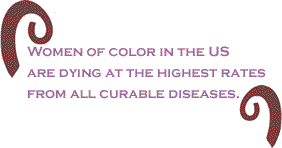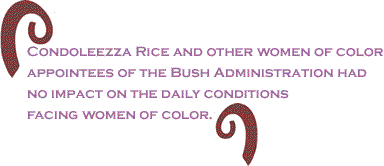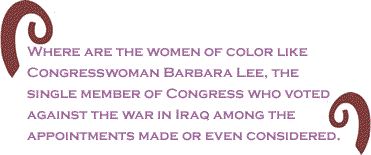
|
|||||||||||||||||||||||

|
|

Custom Search
|
|
 |
|
I recently received photos identified as "the women of color in the Obama administration" from another advocacy group to silence my complaints about the lack of sufficient inclusion of grassroots/working class women of color, especially our leaders, advocates and activists, in the Obama administration and the political parties. The response avoided answering my assertion that most women of color groups are grossly underrepresented, if not completely unrepresented, still. Too many people just look at the skin color or ethnic/cultural groups of women of color and conclude that the presence of any means the inclusion of all and that the end of problems for women of color must have come during the civil rights or women’s movements decades ago. Such people don't look into the well-connected histories of or lack of action on behalf of women of color in general to see if, indeed, the women of the photographs represent the majority of us. One thing is clear, those women of color who are at the bottom of US society don't need tokens, symbols or designated leaders. We need to be part of the action, acting in our own interests, not subjects to be acted on. We already have leaders who are competent to speak for us. Over
and over, we offer the following information: Women of color in
the US are dying at the highest rates from all curable diseases.
Half the deaths of women of color in some of our major cities are
the result of domestic violence. Women of color earn the least of
all groups in the US, below all men and nearly ten percent below
white women. Women from some groups, like Native Americans, Asian
Americans, Pacific Island Americans and Latinas have never been
represented in the US Senate. Women of color are grossly underrepresented
in all legislatures of the US, state and federal. No woman of color
has ever been on the US Supreme Court nor been considered for any
major party nomination to president or vice president. Yet, the
facts are ignored. And, despite great efforts in support of the
Obama campaign which included money, time and votes, women of color
remain unmentioned for the issues that impact us most and uniquely,
beginning with the intersection of racism and sexism which no other
groups experience. The information is still ignored by too many.
The words women of color are absent from most of their databases. Throughout history, there have always been wives of powerful men and a few queens. They did not bring about upward social mobility and equality for most women, let alone for women of color. To the contrary, women whose privileges come from their relationships with men, as a rule, identify with and work for the patriarchic power elite. Nor will the fact of Michelle Obama being First Lady change this. After all, First Lady is simply a title for the wife (or hostess, if he's unmarried) of the president. It is not a job, has no power in government and receives no salary for that reason. Having a tiny percent of women of color in positions in which they act in their own personal or family interests but are held up as symbols of progress for the rest of us is disingenuous at best. Women of color need substantive changes and substantive participation in government leadership roles. We need appointments of those women of color leaders who have demonstrated their education, skills, competence, and expertise of all the duties of their positions but also with a documented history of work on behalf of the masses of us—including those women of color who are committing suicide at the highest rates and who get the least benefit from education. How many times must it be said to be heard? Women of color are the only people subjected to the intersection of racism and sexism, which means that in addition to the racism experienced by men of color and the sexism experienced by white women, we also endure racism from white women and sexism from men of color. Why is there is no discussion of our uniquely difficult situation in any forums other than our own and the too few allies of white men and women and men of color who do support us.
Where are the women of color like Congresswoman Barbara Lee, the single member of Congress who voted against the war in Iraq among the appointments made or even considered. Her integrity and insight exceeded all of her colleagues at the time? Where are the appointments of women like Marian Wright Edelman who is unrivaled in the world in her work leading the Children's Defense Fund? What about all those women represented by Angela Davis who is an academic admired around the world who has suffered injustice herself to bring attention to the circumstances of the masses of the people. There are thousands, if not millions of us. We have education, experience, talent, intelligence and more. Yet, even some of the groups which work so hard in the interests of the masses, look only at surfaces and associations with the power elite as the determiners of competence and not at all at whether the women of color being appointed are getting those positions because they in fact do not represent us, but represent the status quo. We are derided for not being silent about the oppression which is killing us physically and psychologically. We receive responses in a manner to suggest that, except for the chosen ones, the rest of us are uninformed, unintelligent, uneducated, inexperienced, inadequate, unprepared and unskilled. The
photos of the chosen ones are flung at us as if we are ignorant
of them or hostile to them. We are neither. Nor are we their
enemies. We are not envious of or unhappy about any successes they
have achieved. They simply are not representative of most of us.
Those who best represent us are seldom considered, or as one women
of color group has been told, we are “objectionable“—our apparent
punishment for speaking the truth about our situation. An exception
is Hilda Solis, Labor Secretary nominees who comes from a working
class background and has a record of working in the interests of
people from working class, grassroots, farm-working and migrant
backgrounds. It is hoped that organizations which advocate for the grassroots and working class would be attentive to these issues and among the strongest allies of women of color, not part of those who marginalize us and trivialize our issues.
More than 18 months ago, I sent a 25 page document to the Obama campaign policy division to which he responded to me personally, expressing appreciation for many individuals brought to his attention and making commitments that we can no longer discuss with anyone. Whereas, we once had access to Obama's policy team, we seem now to be on the pariah list.. Whatever is intended, it appears the commitments of support to women of color have been abandoned. Among the recommendations that I made was the establishment of community circles through which people across the country could give input into the actions of the Obama administration. This concept and others have been implemented to some degrees, but ironically not including those represented in my correspondence to him. Where we come from, this is referred to as talking the talk without walking the walk because people meant to included are shut out.
For nearly 2 years, many of us have been presenting evidence of our circumstances and asking the same question, when will grassroots/working class/community activist women be equitably represented by those we identify because they already have the experience with all of our ethnic groups? Will we only get more top down selections of symbols who may look like us, but are not connected to us? Will those at the top who continue to marginalize us and trivialize our concerns? Are we to be kept at the bottom of this society forever, denied even the right to cry out at our oppression? Nor is this kind of experience limited to problems with government. Recently, I received an email from the Kellogg foundation informing me that they are focusing on women and children of color. I wrote their program director a long letter with attachments documenting programs and activities through the last 40 years with my comments that while I think it is great that they have such a focus, I find it remarkable than in all these years, with hundreds of programs and thousands, if not millions of women involved, and with all the collaborations and coalitions and more recently the sisterhood among those of us who are addressing and confronting racism, sexism, homophobia, age-ism and more--that we are seldom among those receiving substantive foundation support from any foundation. Often women of color and/or our allies cannot even get symbolic support as happened when I asked a foundation to write a letter in memory of a beloved woman who had spent her life supporting people of color all over the world, including women of color, and who had also donated more than $1 million to the foundation contacted, and they refused even to send a card in her memory. Nor was this an isolated experience, once this very caring, committed, activist woman was dead, it was as if many of those she had helped most just stepped over her body and moved on. None of those I contacted were interested in joining the International Association for Women of Color Day in acknowledging her life of giving to others. The same was true of organizations of another extraordinary woman whom we honored at the same time. One of these women was white, the other black. The refusals to honor their contributions and achievements were shameful and heart wrenching. Sadly, this is a common occurrence. For these reasons, I suggested that the Kellogg Foundation begin to look at the elephant in the room--the intersection of racism and sexism as part of its goal of supporting women and children of color. Until we are included among the leadership sought after and are the developers and implementers of the programs and strategies aimed at our concerns, the foundations will fall short of their stated goals. We are the myriad women of color, who with our allies among white women, men of color and white men, sacrifice lives, careers, health, and resources to implement programs and strategies which succeed in making differences but are not sustained because we lack long term support from either the private or public sectors. Nor are my criticisms unique about issues going unaddressed in this time in which women of color too are euphoric about the election of Barack Obama, yet find ourselves wondering why we still feel the sting of exclusion, why the mere mention of the intersection of racism and sexism is met by so much opposition, irritation, discourtesy and even hostility. A note received recently: “Suzanne, I hate to even think this, but America disses mature people at every turn especially women of all races. It's clear. This is the country for 30-something people. Now, if we started a campaign where 50+ people STOPPED paying taxes, maybe that would work. But that ain't gonna happen either. I hate to be cynical, but it's just the reality of the thing. Of course, we are the architects of reality, so it's US who have to change. Good lord, the show is about NOTHING AT ALL.” A strong and welcomed voice in support of women of color, Eileen Boris, Hull professor and chair of the Department of Feminist Studies, University of California at Santa Barbara spoke out in her January 16, 2009 salon.com essay, “Women need an economic recovery too.” According to Dr. Boris,
With these thoughts in mind, women of color, as yet, cannot count on any help with our most serious concerns. Thus, many of us are engaged in more self-help and collaborative fund-raising activities. As a means of establishing a stream of income to benefit organizations and individuals including the International Association for Women of Color Day, Justice 4 All Includes Women of Color Day, The Black Commentator, Women in Jazz in South Florida (Joan Cartwright)canice Steele, Imani Church in Sacramento which especially supports diverse members of LGBT communities and children of the homeless, a scholarship to support an Afro-Uruguayan woman student in journalism so that she can also accept an offered internship at a Black Newspaper, and other primarily women entrepreneurs who rarely have access to capital, I produced the CD of the song, "Aurora," which I co-wrote with noted jazzman and music minister, Reggie Graham in February, 2008. Inspired by the Obama campaign and the rise in multi-cultural participation in the electoral process, I wrote the lyrics to point out that, like the aurora, the people of the earth have differences but only one world on which we must come together. Joan Cartwright created a video using the first version of the song. Since then, I have secured the participation of Sergio Ortuño, percussionist and director of the Candombe Drum School in Montevideo, Uruguay, with whom the final vision of the CD has been made. It is now on sale online, as the official Women of Color Day song.
Now, we are reaching out to people and organizations everywhere, asking support through purchases of the CD. We ask too that positive comments to encourage others to listen and make purchases be made on the cdbaby.com website. We hope the song will be shared and encourage the commemoration of Women of Color Day--March 1st, annually and globally. We also ask that this information be shared widely to help us encourage the recognition of the achievements and contributions of women of color--to save our lives--and to join with us in as many collaborative actions as possible. Meanwhile, we still wait for a signal from new government leaders, that women of color will be among the beneficiaries of the changes for which we worked, as well as hoped, just as they did. Since so many of those now in power are lawyers, they surely know that "Justice delayed is Justice denied." BlackCommentator.com Guest Commentator Suzanne Brooks is the founder and CEO of International Association for Women of Color Day and CEO of Justice 4 All Includes Women of Color. Click here to contact Ms. Brooks. |
|
Any BlackCommentator.com article may be re-printed so long as it is re-printed in its entirety and full credit given to the author and www.BlackCommentator.com. If the re-print is on the Internet we additionally request a link back to the original piece on our Website. Your comments are always welcome. eMail re-print notice
If you send us an eMail message we may publish all or part of it, unless you tell us it is not for publication. You may also request that we withhold your name. Thank you very much for your readership. |
|
| |
|


































